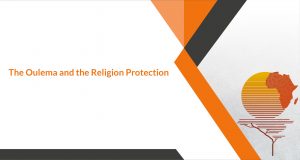The Oulema and the Religion Protection

Religious scholars are trained in religious sciences, in mosques scattered, in towns and cities.
One distinctive feature of Morocco’s religious scholars is their ability to memorize the whole Qur’an before specializing in religion sciences.
The Oulema’s task is to teach religion and to transmit it as they had inherited it from the prophets. The Commander of the Faithful seeks the help of the Oulema to discharge his duty as guardian of religion.
After graduating, the Oulema undertake their tasks which consist especially of teaching and administering justice.
Before this era, there was in every region, be it a city or a huge tribe, a famous religious scholar around whom rallied the scholars in his era. His title was “Sheikh al-jamāca”, or the head of the group of religious scholars. There was in the king’s entourage a sheikh who was viewed as the senior scholar of the heads of the group of religious scholars.
Concerning this issue, that of the Oulema, as is the case with other issues, Morocco has maintained its traditions which it molded in an institutional and appropriate organization that is compatible with the requirements of the times.
The scholars entrusted with supervising the field of religious affairs are members of the Supreme Scientific Council, whose seat is in Rabat, is presided over by the Commander of the Faithful. The Supreme Scientific Council has eighty-two local scientific councils, a number that corresponds to that of provinces and regions; they cover the whole of the national territory.
The Supreme Scientific Council operates through its competent committees one of which is the Fatwa Committee which issues rulings in legal cases pertaining to public affairs, and the Participatory Financial Committee whose counsel is sought by the banks on some types of transactions.
The Supreme Scientific Council submits a yearly report about its activities to the Commander of the Believers on the occasion of celebrating the Prophet’s birthday. It organizes scientific activities whose results are published in documents, such as the following:
1) A document entitled “Unspecified Public Interests in Māliki Jurisprudence” which shows that all the laws issued by government departments in various types of public interest carry the force of Sharia laws so long as they do not contradict a text on which there is no independent judgment in the Qur’an. The importance of this independent judgment lies in the response to currents that accuse civil governments in Muslim countries of not applying Sharia.
2) A document entitled “Sharia Rulings on Cases of Terrorism”. It invalidates, through Sharia evidence based on reason and tradition, the terrorists’ justifying claims that their criminal actions are supported by Sharia.
3) A document which establishes that Salafism applies to all Muslims, and not to a special group, because the followers of the Salaf, ie., the companions of the Prophet and their descendants of the first generations, still exist in the lives of all Muslims albeit invarious degrees of their ability as is explicitly stated in the Qur’an.
4) A document entitled “The Path of Scholars” in which they demonstrated their way in pledging loyalty to the great imamate that takes care of general issues, their adherence to the faith and doctrinal constants, as well as their positive view of the path of Sunni purification known as Sufism.
